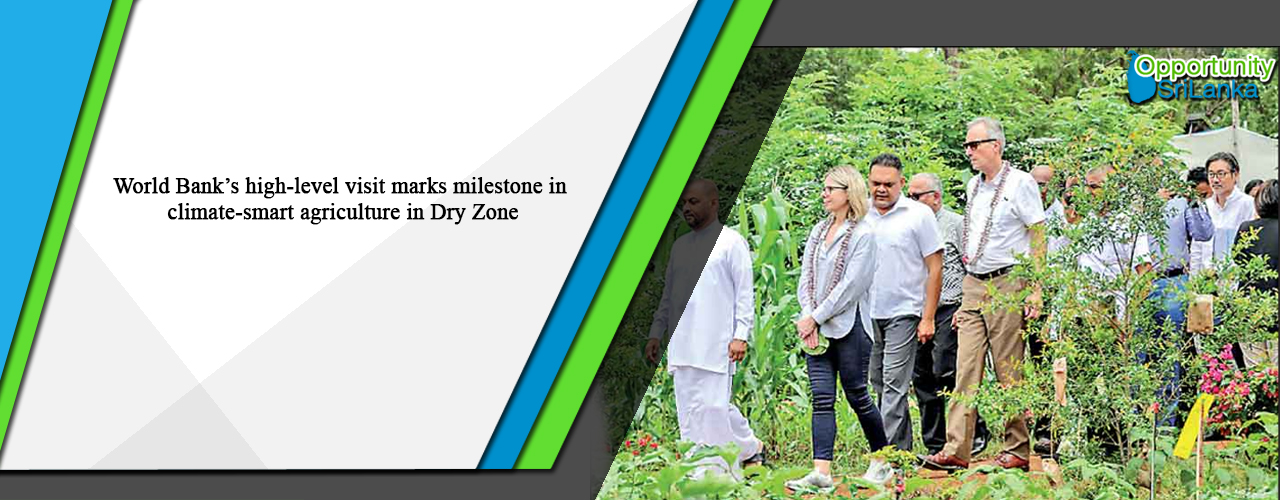World Bank’s high-level visit marks milestone in climate-smart agriculture in Dry Zone
Daily FT: World Bank Managing Director for Operations Anna Bjerof and Regional Vice-President South Asia Martin Raiser, yesterday conducted a field visit to the Climate Smart Farmer Training School in Thirappane.
The purpose of their visit was to assess the progress of the Climate Smart Irrigated Agriculture Project (CSIAP).
It was Bjerde’s first visit to Sri Lanka in response to a request made by President Ranil Wickremesinghe during his special meeting with World Bank President Ajay Banga on the sidelines of the UN Summit in Washington DC last month. During their discussion, the President requested Banga’s assistance in advancing Sri Lanka’s climate-friendly sustainable agriculture initiative.
Bjerde’s visit to Sri Lanka serves as a confirmation of the World Bank’s support for this initiative.
The CSIAP has undertaken an ambitious initiative to establish a comprehensive Farmer Training School known as “Deshaguna Suhuru Govi Puhunu Pasala” in Mannakkulama Village, Thirappane, situated in the Anuradhapura District. This Farmer Training School will play a pivotal role in training and equipping farmers with hands-on experience in Climate Smart Agriculture (CSA) practices and cutting-edge agricultural technologies.
This visit by Bjerde and Raiser and a delegation from the World Bank, Asia Development Bank, JICA and USAID underscores the World Bank’s and other partners’ commitment to supporting initiatives that aim to improve the agricultural sector and enhance climate resilience in Sri Lanka’s dry zone.
Following her visit to the Climate Smart Farmer Training School (FTS) in Thirappane, Bjerde and the delegation toured the Ambul Banana Cluster in Rajanganaya. This project supports smallholder farmer clusters in the project districts to produce high value agricultural products in order to improve the farmer household income significantly as well as to increase the export earnings of the country.
Expressing her views Bjerde addressed the significance of a school for farmers in the region, focusing on climate-smart agriculture. She highlighted the changing weather patterns caused by climate change and how this school is equipping farmers with techniques to enhance productivity and resilience in crop production.
She also mentioned three major benefits of this project: the transition to renewable energy, particularly solar power; increased and stable livelihoods, enabling children to access education, including higher education; and diversified and sustainable crop yields, ensuring better nutrition. She expressed pride in the World Bank’s support for this project and emphasized the need for more initiatives like this to address the challenges posed by climate change, both through mitigation and adaptation efforts. She hoped that the project could be sustained by building on the lessons and experiences demonstrating the positive impact on changing lives and livelihoods of farmer communities.
OSL take:
Sri Lanka’s agriculture industry is a fast expanding one given the growing local demand as well as in the overseas markets. Local authorities are also focused on further developing and uplifting the many sectors in the agriculture industry. These measures include the development of new High yield seeds for key crops and agro fertilizers, value addition for agriculture produce aimed at the exports markets, technical expertise and mechanization. All these present a host of new business/investment opportunities for foreign businesses/investors. Also, some multilateral financial institutions have assigned finances for development work in the agriculture industry making funding also available for some of the projects in the industry. Given the growth and business potential in Sri Lanka’s agriculture industry, foreign businesses/investors could explore the expanding opportunities in the industry. Foreign businesses could also look at forming partnerships or joint ventures with local businesses engaged in the agriculture industry due to the profits recorded by them even amidst challenging economic conditions.
| Article Code : | VBS/AT/20231106/Z_1 |

